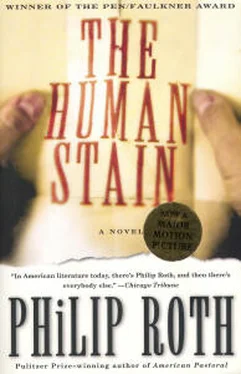Another of her problems. She does not want to alienate these women. Yet she is no less philosophically isolated from them than from the men. Though it would not be prudent for her to tell them so, the women are far more feminist, in the American sense, than she is. It would not be prudent because they are dismissive enough and seem always to know where she stands anyway, always suspecting her motives and aims: she is attractive, young, thin, effortlessly stylish, she has climbed so high so fast she already has the beginnings of a reputation beyond the college, and, like her Paris friends, she doesn't use or need to use all their clichés (the very clichés by which The Diapers are so eagerly emasculated). Only in the anonymous note to Coleman Silk did she adopt their rhetoric, and that was not only accidental, because she was so overwrought, but, in the end, deliberate, to hide her identity. In truth, she is no less emancipated than these Athena feminists are and perhaps even more: she left her own country, daringly left France, she works hard at her job, she works hard at her publications, and she wants to make it; on her own as she is, she has to make it. She is utterly alone, unsupported, homeless, decountried— dépaysée. In a free state but oftentimes so forlornly dépaysée. Ambitious? She happens to be more ambitious than all those staunch go-it-alone feminists put together, but because men are drawn to her, and among them is a man as eminent as Arthur Sussman, and because, for the fun of it, she wears a vintage Chanel jacket with tight jeans, or a slip dress in summer, and because she likes cashmere and leather, the women are resentful. She makes it a point not to be concerned with their ghastly clothing, so by what right do they dwell on what they consider recidivist about hers? She knows everything they say in their annoyance with her. They say what the men she begrudgingly respects are saying — that she's a charlatan and illegitimate — and that makes it hurt more. They say, “She is fooling the students.” They say, “How can the students not see through this woman?” They say, “Don't they see that she is one of those French male chauvinists in drag?” They say that she got to be the department chair faute de mieux. And they make fun of her language. “Well, of course, it's her intertextual charm that's gotten her her following. It's her relationship to phenomenology. She's such a phenomenologist ha-ha-ha!” She knows what they are saying to ridicule her, and yet she remembers being in France and being at Yale and living for this vocabulary; she believes that to be a good literary critic she has to have this vocabulary. She needs to know about intertextuality. Does that mean she's a phony? No! It means that she's unclassifiable. In some circles that might be thought of as her mystique! But just be the least bit unclassifiable at a backwoods hellhole like this place, and that annoys everyone. Her being unclassifiable even annoys Arthur Sussman. Why the hell won't she at least have phone sex? Be unclassifiable here, be something they cannot reconcile, and they torment you for it. That being unclassifiable is a part of her bildungsroman, that she has always thrived on being unclassifiable, nobody at Athena understands.
There is a cabal of three women — a philosophy professor, a sociology professor, and a history professor — who particularly drive her crazy. Full of animosity toward her simply because she is not ploddingly plugged in the way they are. Because she has an air of chic, they feel she hasn't read enough learned journals. Because their American notions of independence differ from her French notions of independence, she is dismissed by them as pandering to powerful males. But what has she ever actually done to arouse their distrust, except perhaps handle the men on the faculty as well as she does? Yes, she'd been at dinner in Great Barrington with Arthur Sussman. Does that mean she didn't consider herself his intellectual equal? There's no question in her mind that she is his equal. She isn't flattered to be out with him — she wants to hear what he has to say about The German Ideology. And hadn't she first tried to have lunch with the three of them, and could they have been any more condescending? Of course, they don't bother to read her scholarship. None of them reads anything she's written. It's all about perception. All they see is Delphine using what she understands they sarcastically call “her little French aura” on all the tenured men. Yet she is strongly tempted to court the cabal, to tell them in so many words that she doesn't like the French aura — if she did, she'd be living in France! And she doesn't own the tenured men — she doesn't own anyone. Why else would she be by herself, the only person at the desk of a Barton Hall office at ten o'clock at night? Hardly a week goes by when she doesn't try and fail with the three who drive her nuts, who baffle her most, but whom she cannot charm, finesse, or engage in any way. “ Les Trois Gráces ” she calls them in her letters to Paris, spelling “ gráces ” maliciously “ grasses. ” The Three Greaseballs. At certain parties — parties that Delphine doesn't really want to be at— Les Trois Grasses are invariably present. When some big feminist intellectual comes along, Delphine would at least like to be invited, but she never is. She can go to the lecture but she's never asked to the dinner. But the infernal trio who call the shots, they are always there.
In imperfect revolt against her Frenchness (as well as being obsessed with her Frenchness), lifted voluntarily out of her country (if not out of herself), so ensnared by the disapproval of Les Trois Grasses as to be endlessly calculating what response might gain her their esteem without further obfuscating her sense of herself and misrepresenting totally the inclinations of the woman she once naturally was, at times destabilized to the point of shame by the discrepancy between how she must deal with literature in order to succeed professionally and why she first came to literature, Delphine, to her astonishment, is all but isolated in America. Decountried, isolated, estranged, confused about everything essential to a life, in a desperate state of bewildered longing and surrounded on all sides by admonishing forces defining her as the enemy. And all because she'd gone eagerly in search of an existence of her own. All because she'd been courageous and refused to take the prescribed view of herself. She seemed to herself to have subverted herself in the altogether admirable effort to make herself. There is something very mean about life that it should have done this to her. At its heart, very mean and very vengeful, ordering a fate not according to the laws of logic but to the antagonistic whim of perversity. Dare to give yourself over to your own vitality, and you might as well be in the hands of a hardened criminal. I will go to America and be the author of my life, she says; I will construct myself outside the orthodoxy of my family's given, I will fight against the given, impassioned subjectivity carried to the limit, individualism at its best — and she winds up instead in a drama beyond her control. She winds up as the author of nothing. There is the drive to master things, and the thing that is mastered is oneself.
Why should it be so impossible just to know what to do?
Delphine would be entirely isolated if not for the department secretary, Margo Luzzi, a mousy divorcee in her thirties, also lonely, wonderfully competent, shy as can be, who will do anything for Delphine and sometimes eats her sandwich in Delphine's office and who has wound up as the chairperson's only adult woman friend at Athena. Then there are the writers in residence. They appear to like in her exactly what the others hate. But she cannot stand them. How did she get in the middle like this? And how does she get out? As it does not offer any solace to dramatize her compromises as a Faustian bargain, so it isn't all that helpful to think of her in-the-middleness, as she tries to, as a “Kunderian inner exile.”
Читать дальше












